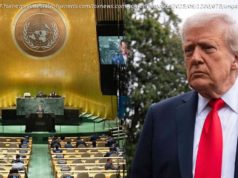He’s asking us to believe his denial of a sexual assault accusation, but he keeps displaying a lack of honesty.
Dogged by an accusation of a sexual assault in high school and pressed to defend his character, Brett Kavanaugh went on Fox News with a curious strategy. Instead of owning up to his high school drinking habits, he told what appear to be lies.
Kavanaugh insinuated he never drank when he was underage, saying on Fox that when he was a senior the “drinking age was 18, and yes, the seniors were legal and had beer there.”
Not only is this not true with regard to the legal drinking age in Maryland at the time, it’s extremely hard to square with the portrait he otherwise paints of himself as a hard-partying kid. Thirty-five years ago he seemed to have joked in his yearbook about being the treasurer of the Keg City Club, and in 2015 he quipped that “what happens at Georgetown Prep stays at Georgetown Prep.”
Obviously if we disqualified people from high office for having engaged in underage drinking or some youthful drunken antics, we’d have a very hard time staffing the government. The mere fact that Kavanaugh drank to excess in high school is not relevant to whether he is fit to serve on the Supreme Court. And it certainly doesn’t prove that he sexually assaulted anyone.
But it does factor into the question at the heart of this saga: Should we take Kavanaugh’s word or that of his accusers? Kavanaugh has consistently had trouble being honest with both Congress and the public. That he would choose to say things that aren’t true, yet again, just makes it harder to trust any of his claims.
In the context of a friendly Fox News interview, he knew perfectly well that he wouldn’t be pressed hard on this or any other contradiction. By lying about his drinking he managed to present an image as an all-around Boy Scout directly to his party’s base, including evangelical Christians, who he needs to get his confirmation jammed through.
But to any observer with evidence from outside the Fox News bubble, he simply seems like a liar.
The key exchange came after the interviewer, Martha MacCallum, asked Kavanaugh about unsubstantiated insinuations from lawyer Michael Avenatti that Kavanaugh might have been present at parties where women were gang-raped.
One big problem here is that Kavanaugh turned 18 in February of 1983 and Maryland raised its drinking age to 21 back in July of 1982. What he is perhaps misremembering is that the District of Columbia had a lower drinking age of 18 through the mid-1980s, so it was common at the time for high school seniors from the Maryland suburbs to buy beer legally in the District.
Now obviously anyone who has ever attended a party in high school or college at which alcohol was served is going to be rightly skeptical of the claim that Kavanaugh routinely attended house parties where underage drinking was banned. But his basic claim about the legal drinking age at the time is also provably false, a small fact that he probably neglected amid the larger implausibility of the overall argument.
Meanwhile, a very large volume of available evidence strongly suggests that Kavanaugh was a fairly serious partier at this point in his life.
It seems fundamentally silly to be obsessing over a Supreme Court nominee’s yearbook. But Kavanaugh’s confirmation has come to hang in the balance over sexual assault charges that are necessarily hard to prove one way or another. In that view, questions about his present-day credibility are necessarily central.
While there’s no clear documentary evidence of his relationships with women at the time, there is clear documentary evidence about his drinking habits in the form of his yearbook entry.
Both the references to the Keg City Club and “100 Kegs or Bust” are very clear indications that Kavanaugh was devoted beer drinker — as is the fact that he was the biggest contributor to the Beach Week Ralph Club.
“Malibu Fan Club” also appears to be a reference to a brand of rum that’s perennially popular with younger drinkers (it’s at least conceivable that he’s just a big fan of either the Southern California town or the Chevrolet model of the same name). More ambiguously, “boofing,” the Rehoboth police (of a beach town where “ralph”-ing might have happened), and the “FFFFFFFourth of July” all seem like references to rowdy partying.
Indeed, at a slightly earlier period in his career Kavanaugh seemed to deliberately cultivate an image as having been a hard-partier in high school.
Speaking to Catholic University’s Columbus School of Law in 2015, he noted the presence of three Georgetown Prep graduates in the audience and said “Fortunately we’ve had a good saying that we’ve held firm to this day, as the dean was reminding me before the talk, which is, ‘What happens at Georgetown Prep stays at Georgetown Prep.’ That’s been a good thing for all of us, I think.”
Later, at Yale, Kavanaugh joined both the fraternity DKE and a secret society (you’ve probably heard of Skull & Bones but Yale has a bunch of others) called Truth & Courage both of which were known for their partying .
To be clear, it’s not particularly unusual for high school students to be involved in drunken partying, and federal data on binge drinking indicates that it was significantly more common when Kavanaugh was in school .
But Kavanaugh’s drinking is unusually well documented. A friend and classmate of his named Mark Judge actually wrote a book titled Wasted: Tales of a GenX Drunk that appears to discuss it.
As CNN has reported, Judge’s book reveals the story behind the 100-keg joke on the yearbook page. What happened, according to Judge, was that students were dismayed to learn that they would be required to spend their senior Sundays doing community service.
The book also discussed a lightly disguised person named Bart O’Kavanaugh who puked in someone’s car the other night and passed out on the way back from a party.
Drinking to excess is unhealthy and sets the stage for potentially illegal activity, including unsafe driving and violence. However, it’s hardly unforgivable and certainly not proof that Kavanaugh committed any of the serious offenses against women that have been charged. The disparity between Kavanaugh’s statements about his high school activities and the apparent facts, however, do raise a serious question about his honesty.
As someone who was certainly a contributor to his own high school ralph club, I’m not in a position to hold Kavanaugh’s partying lifestyle against him.
But what a person chooses to say about past events of which there is clear documentary evidence tells you something about his overall level of honesty and forthrightness .
Documents produced later as part of his Supreme Court confirmation hearings made it clear that Kavanaugh had, in fact, been involved with the Pryor nomination and had corresponded extensively with Miranda about the contents of the staff emails. In both cases it doesn’t rise to the level of legal perjury because there are ways to parse his answers as narrowly truthful.






